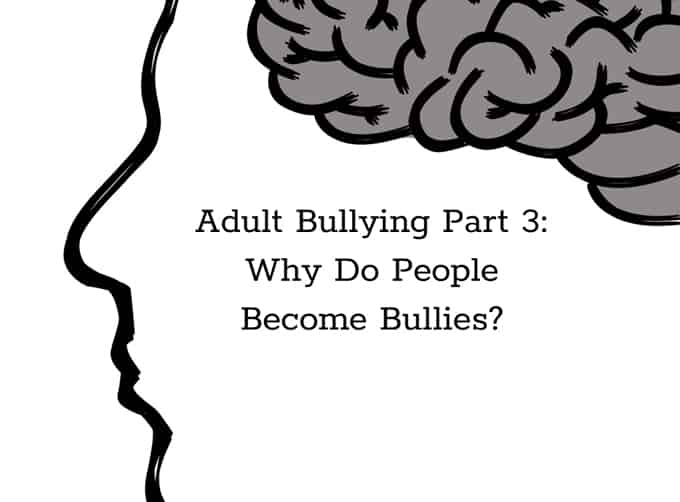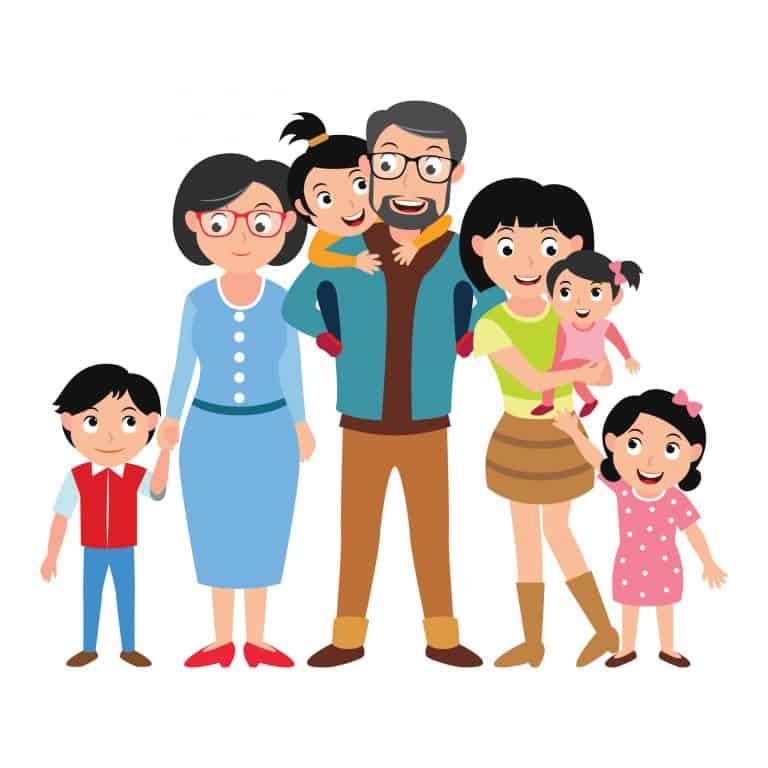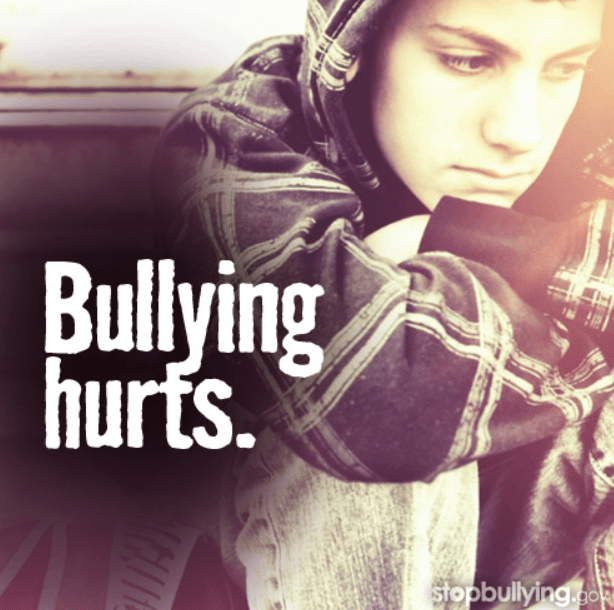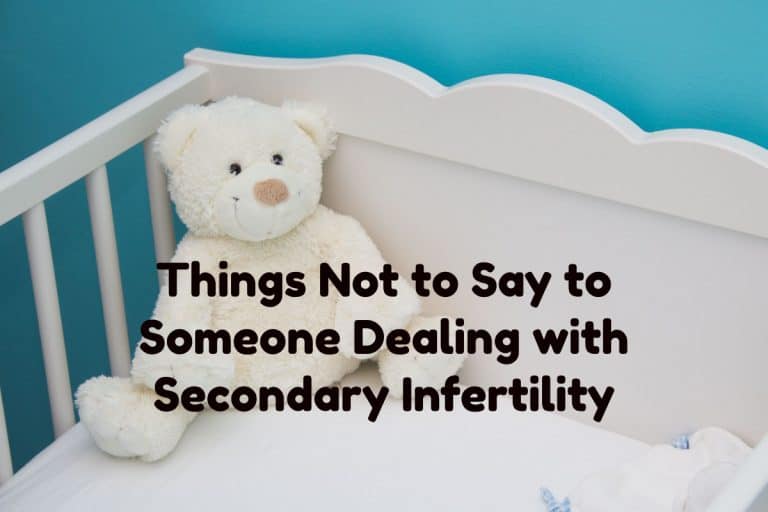Adult Bullying: Why Do People Become Bullies or Bully Others?
I’ve been writing about bullying for years now, beginning back in 2013 and ramping up in 2014 when my son faced a serious bully in middle school. Watching him deal with it, from the way it affected him socially, to the way it affected his grades and his self-esteem, to how it changed his freedom, was an eye opener. We had never dealt with it on this scale, and it made us wonder, why do people become bullies? Why do people bully others? Let’s dive into adults who bully and why adults that bully do it.

All these years later, I still don’t know, but after a lot of research, I’ve learned a few possible reasons. I’m going to share them here so we can further adult bullying discussion, before I bring in a couple of experts on bullies, particularly adult bullies, and dealing with them.
Let me back up a little though. When my son was getting chased on his way home from school, when we were having to ask a bat-wielding teenager to leave our yard (and when he would tell us no, resulting in multiple police visits), when I lost my cool and began to cry in the vice principal’s office because this child had been suspended over 10 times for bullying yet his parents were still claiming he was innocent, when this child ignored a restraining order and still physically assaulted my child, and then when the judge told him that he was looking at stalking, harassment and assault charges that could result in juvenile hall, we watched our son’s behavior change. We watched him have to be in fear before he left the house. We watched him go from loving school to hating it. We watched him cringe when the doorbell rang and when someone who had been his friend backed away because he or she didn’t want to be bullied.
But he had us and the rest of his siblings. We surrounded him in court as the bully’s dad called him a liar and the judge reminded the dad that perjury was a bad thing. (Adults who bully often have children who become bullies.) We let him ask the police numerous questions until he felt safe, and we hugged him when he was reassured that, despite this one individual who was far too focused on causing him harm and to be fearful, the police were there to help us and him. We involved him in discussions with the school staff, so he could see the sheer volume of support he had. We made sure he wasn’t victim-shamed and that he knew of all the witnesses that eventually came forward once they realized the bully was being handled or that their parents encouraged they do the right thing.
When court was over and the bully and his father left the courtroom, still glaring at us nastily, we celebrated with our son that he was able to go back to school. We weren’t sure whether the bully would stop his behavior, but we’d taught our son to speak up for himself and the system had shown him that he was not powerless. He mattered. He learned that courage and bravery were important and that even if the bully didn’t stop, he had a world of support and help available to him. He also learned he didn’t have to tolerate bad behavior, that he didn’t have to allow it to ruin any aspect of his life and that standing up for yourself is not wrong. Lemonade out of lemons.
Because I worked so hard to ensure my son thrived after his bullying experience, I can’t ever allow myself to go against what we worked so hard to teach him, nor can I stand by and let others deal with bullying. We have to be role models for him and all our kids, now and always. His bully didn’t have that, and after all my son went through, he had sympathy for the kid whose dad lied, defended and threatened despite over 50 witness statements to the contrary. My son said to me, on the way home from the courthouse, “I hope he stops, but I feel sorry for him that he has a dad who is helping him be a bad person instead of helping him be a good person.”
Word, kiddo, word.
So why do people become bullies, and in general, why do people bully? Lots of reasons, from what I’ve learned and seen, and here are some of them. I’m focusing mostly on adult bullying in this series, but bullying stems from a lot of different places and some are rooted in childhood.
Why do people become bullies?
Their parents are bullies, or they were raised in a bullying environment: if this is what they see as “normal,” they don’t know any different. Some parents force their children to be bullies, while others just absorb the behavior they see from those who should be role models. (Bullying is not always a conscious behavior.) As people mature into adults, they don’t always realize it and it continues into adulthood. Like I said above, adults who bully often pass it onto their kids.
Feelings of insecurity or lack of control in their personal life: if they are low on self-esteem or have an unhappy home life that renders them powerless, they look to obtain that control over others and it boosts their self-esteem and security by feeling powerful over someone else. Picking on others makes them feel superior.
Bullying gives the bully attention: some people thrive on the attention being a bully gives them, even if it’s negative attention. Some bullies are able to twist the situation or mislead others by putting on a good facade, so their bullying behavior isn’t always seen by others as the behavior it truly is, so they can appear to be a victim or a cool kid. (This is common for cyberbullies.)
Loneliness: a lot of kids in school bully because they have no friends, and adults that bully are frequently unhappy in their relationships, lack true friends or their marriage isn’t a happy one. (This is why we have to teach our kids from early on to try to befriend the lonely kids; it may not change anything, and it’s not our kids’ responsibility to change them, but no one should eat alone at lunch or stand alone at recess unless they want to.)
Jealousy: I really dislike this one, because I feel like we all envy things at times in life, but jealousy, to me, is when our envy crosses over into ‘if I can’t have xx, no one can.’ They develop a resentment or a grudge and sometimes a hatred towards others, and a need to destroy what they have, which can come out as bullying. Sometimes the behavior is focused towards those of whom they are jealous, and others it just comes out on the nearest, easiest victim. This type of bully is frequent at the workplace, where people don’t know each other enough but the bully sees that the victim got a promotion, or has a better job, but they don’t know what the person goes through in the rest of their life.
They struggle socially themselves: if they can make a person look worse than they do, they then aren’t the lowest person on the social ladder.
Anger issues: this is related to a home environment sometimes and their loneliness factor, and if they’re unhappy, because taking anger out on others by bullying is a way to release that anger. (And just like the above reason, the victim often has nothing to do with the bully’s anger.)
Emotional/mental health issues: some bullies have moderate to severe emotional and/or mental health issues, diagnosed or undiagnosed. There are a number of mental health disorders that can include bullying as a symptom and/or side effect.
Lack of empathy: most of us go through life feeling bad for others, but some people don’t have that trait. Some are referred to as a narcissistic bully, while others were just raised in an environment that didn’t model compassion, and this can come out in bullying because they don’t care about others or they don’t understand the ramifications of their behavior.
Peer pressure: this one’s really common in school, as kids form groups and without even realizing it, they sometimes develop a mob mentality. If one of the group is a bully, the others either are forced to go along with it to remain part of the group or maintain the ‘respect’ of the bully, or they just start to emulate it without even realizing it. Mob mentality can result in everyone in a group bullying the same person simply because one person has an issue, as mob mentality can breed a false sense of loyalty that blinds people to reason and fairness. The rest of the group may also want to avoid becoming a victim, as now they’ve seen what the bully can do. (My son’s bully had a strong support circle initially, but after a few months of worsening behavior, the group started to fracture, leaving him alone; on one hand, this was good, but on the other, he became lonely and he took that out on my son.)
Laziness: it’s easier to pick on someone than to improve your own shortcomings. (Again, more common in younger bullies, as well as workplace bullies.)
In the end, bullying is a widespread problem with widespread reasons and the list above, as long as it is, is not exclusive. There’s no one size fits all approach or repair, but one of the most common questions asked about bullying in history is “why do people become bullies?” (Searching for this info confirms this to be true!) It doesn’t necessarily help us find resolution, but it gives insight towards the bully, and if we have compassion, we can feel for them a little….because if we can’t, we’re part of the problem, and not part of the solution.
But what ended up happening with my son’s bully? He moved away. Apparently they moved a lot, and who knows what was going on his home life. (We knew he’d had access to weapons, evidenced by a public photo, so we worried a little extra about that.) My son saw him again a couple of years later when he moved back into our neighborhood. He left my son alone, and they ended up peacefully co-existing on a sporting team. There was never another issue between my son and that boy, and my son maintained his compassion towards him. I am a proud mama. I do hope that the kid didn’t grow up to be one of those adults who bully. Stats aren’t great but I still have hope that people are good.
Next Up in Adult Bullying: Bullying in College
Stay tuned for next week’s adult bullying post #4, where we’ll talk about bullying in college. College is where many of our young adults spend additional formative years of their growth. College is competitive, exhausting and amazing, but it’s a lot of pressure, and as in any stressful environment, there will be bullies. Come back next week where we talk about helping our young adults move beyond! And if you haven’t read my other posts on bullying, you here are a couple.
Types of Bullies and How to Spot Them
Thanks for reading my series on adults who bully! This doesn’t need to keep happening. We CAN stop it.







You are very wrong about your opinion concerning a bully’s motives. Bullies do not become that way because they are unhappy, badly treated at home, have a low self-esteem, are lonely or completely friendless, or are otherwise maligned or abused. They are not jealous or envious of their victims, they are contemptuous of them. They do not secretly admire and wish to emulate the people whom they terrorize, they despise them. Most often a bully is a charming, attractive, popular individual who has a large circle of devoted friends, retains a plethora of loyal admirers who will always defend them, and is the pet of teachers at school or the administrative supervisors at work. They bully to amuse themselves, to maintain what they consider is the proper social status quo of who is “in” and who is “out”, and to hold on to social power by shaming, humiliating, abusing and mocking anyone whom they deem as an inferior or who somehow gets in their way or irritates them just for existing in the same school building or workplace office as they do. It is tiresome to read, over and over, the same pat “reasons” for the bully. They do what they do because they know they can get away with it and the process of emotionally fracturing people or frightening them gives them a great deal of pleasure. Most of all, they never regret bullying, deny that they do it or insist they have explicit purpose for doing so because their victims “deserve” it, or, if confronted with enough complaints about their conduct whether in youth or adulthood, conveniently have “forgotten” that they have done anything wrong or that someone else has a problem or is imagining things. Even without defending these psychopaths, you excuse and justify their behavior by giving the explanation that they, themselves, are somehow wronged and miserable individuals who have to compensate for it. They’re not sick or unhappy. They don’t have deflated egos. They’re just cruel people who enjoy behaving that way.
Hello! Thanks for reading the post! I’m sorry we don’t agree. I’ve actually done extensive studies on this and worked in the mental health field for quite a while but I know there’s no exact science to this. They are indeed frequently unhappy people, whether they realize it or not. I agree though that they are not jealous or envious — which is why I said in my post that I dislike that option, despite it being a popular ‘reason.’ Cruel though, definitely. I’m sorry if you’re experiencing any bullying!
You are 100% right! I’ve endured this with my husband daughter who has, from day one, set out to destroy my marriage. Online and off. She FHAs what I call a whole bunch of flying monkeys who cheer her on and feel sorry for her because of the lies she had told on me. She even went as far as to team up with my ex husband to create a smear campaign on me. I’m to the point that I’m afraid to tell anyone my name in public or anywhere else I go that to do business, for fear that it’s one of her friends and they will recognize me and cause me problems wherever I’m at if they can. It’s caused me so much mental pain and anxiety that I don’t want to leave the house to go anywhere. 7 years and it ruined my reputation and relationship not only with my new husband, but my own children who are embarrassed that their mom is being unfairly harassed by a spoiled brat who can’t get over her dad remarried. I wasn’t the cause of his divorce either. I didn’t meet him until he’d already been divorced 2 years. I’d like to find a page of others who have been through something similar. Maybe it would help to talk.